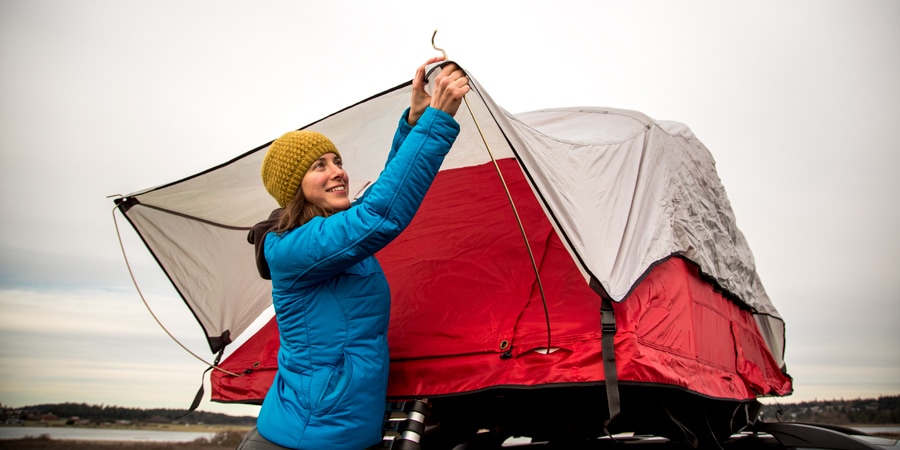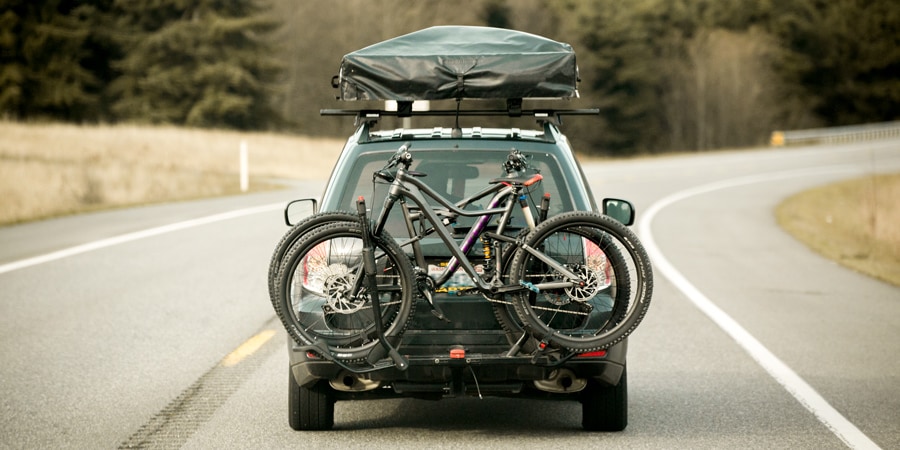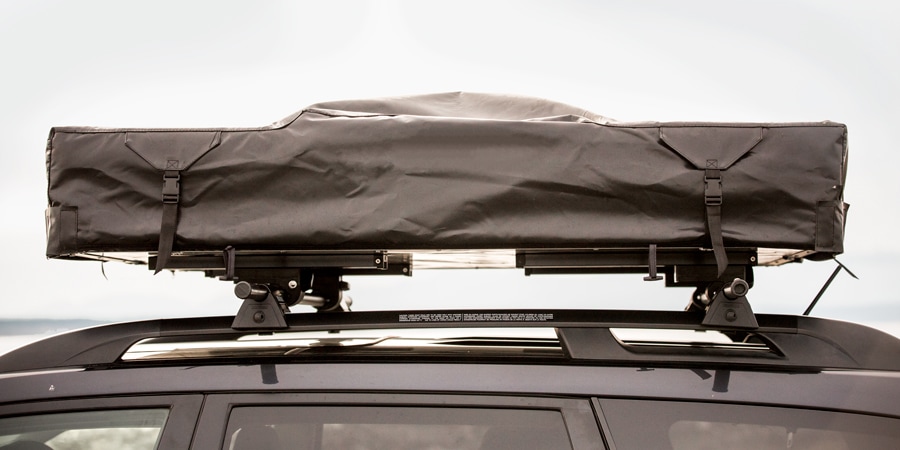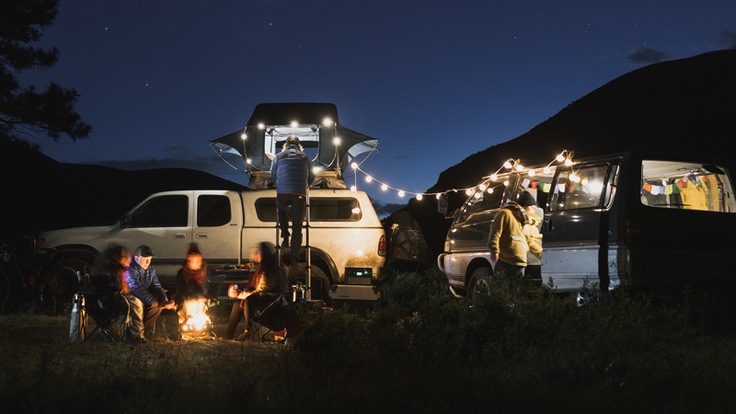Given that camping has been around since Homo erectus came down from the trees, it wouldn't seem like we have many innovations left in the art of sleeping under the stars. That said, roof-top tents, pitched atop their lofty perches, are getting double-takes from a lot of ground-dwelling campers these days.
If you're thinking about buying a roof-top tent, here's what you'll need to know.
- Pros and cons of roof-top tents: Quick setup vs. steeper cost are key considerations.
- How to know which tent works with your vehicle: Check tent, vehicle and rack specs carefully before you buy.
- How they attach to your vehicle: The floor bolts to your roof rack, so make sure you have an adequate setup.
Additional considerations: Annexes, tent durability and shipping considerations are among the details you'll want to think about before you buy.
The Appeal of a Roof-Top Tent

Though roof-top tents have become a phenomenon in the U.S. in recent years, they've been around for decades, gaining greater popularity initially in places like Australia, where camping above the realm of creepy crawlies was instantly recognized as a genius idea.
Many roof-top tent owners today talk about how a high vantage point resonates with them on a primal level. Perhaps it's harkening back to childhood and a love of treehouses—or deeper in our psyches, when we slept in trees so we could survey our surroundings from a safe vantage point before drifting off to dreamland.
Pros of a Roof-Top Tent
- Pitching ease: It's engineered for quick setup. Once in camp, you undo a few straps, pop it open and deploy the poles and ladder.
- Beefy construction: Generally, the floor, tent fabric and pole materials are extra robust and able to withstand stormy weather.
- Comfort: Most come with a super-plush foam mattress.
- Camp anywhere: Set up in a campground, parking lot, remote dirt track, wherever.
- Camp above the ground: Keeps your tent floor clear of rainwater runoff, crawling creatures and rocks and sticks.
- Camp on the level: Strategically placed blocks or rocks under tires can help you keep things on an even keel.
Cons of a Roof-Top Tent (yes, there are a few)
- Cost: Significantly pricier than a camping tent (cheaper than an RV, though)
- Aerodynamic drag: The faster you drive, the greater the drag (and the impact on your gas mileage or battery usage).
- Initial rooftop attachment is a chore: You also need to decide if you want to go to the trouble of removing it between camping trips.
- Complicates day trips: You can't leave it set up while you drive your car away from your long-term camp.
Fitting a Roof-Top Tent to Your Vehicle

Most roof-top tents weigh more than a hundred pounds, so you need to be sure that your rack is up to the task. If you don't have a roof rack yet, then you'll need to consider your tent weight as you shop for a rack to serve as its foundation. The specs you need aren't always easy to find, so you might have to contact your vehicle manufacturer and rack manufacturer directly to get the information you need.
To check if a roof-top tent will work on your vehicle, look up the following information:
- Total tent weight: That should be in the tent's product specs.
- Car and rack dynamic weight capacity: This measures the ability to support that tent weight while you're driving. You need to verify this spec for both the vehicle and your roof rack. So if you're putting the tent on a separately purchased roof rack, you have to check your vehicle owner's manual for the roof's dynamic weight capacity and your rack owner's manual for that same spec. Rack brands like Yakima, Thule and others typically have greater load capacities than factory racks.
- Rack compatibility: Check the owner's manual to be sure that your rack works with a roof-top tent. (Some racks/components are listed as "not compatible.")
- Static weight capacity: The ability of the rack (and vehicle roof) to support its designated number of sleepers and their gear isn't typically an issue. Most car roofs are already engineered to withstand loads relating to a rollover accident. Couple that with the load distribution provided by the sturdy tent-floor platform and extra support provided by the ladder, and you have one very robust structure. That said, you still need to confirm that the static weight capacity on your vehicle and on your rack will support the weight of your tent, plus everyone in it and their sleeping gear.
Attaching the Tent to Your Roof Rack

Though setup is a breeze once you drive your vehicle into camp, the initial process of bolting the tent to the roof rack will take some time. Read and follow all the provided installation instructions carefully. And you'll need at least one strong partner to be nearby because you'll need help to lift the tent up onto your roof rack.
Additional Shopping Considerations
The one big factor is determining which tent models will work with the load capacity of your vehicle rack. After that, you have a handful of things to consider:
- Annexes and awnings: Some models include extended living spaces or covered areas; some tents give you the option of adding one later.
- Durability levels: Though all roof-top tents are extra sturdy, some brands offer super rugged models designed for extended trips in extreme climates. Some brands also offer all-mesh canopies as an option.
- Hardtops: Fabric models are much more affordable; hardtops keep things more fully protected as you drive.
- Shipping costs: Buying in-store is the simple solution, though some models might only be available online. Because it's a heavy item that's costly to ship to your home, look for workarounds like REI's option to ship to a store for free.
- Try before you buy: Finding a place that rents roof-top tents will take some research, but it can pay dividends—because your most important consideration is to decide if this elevated version of van life is for you.
Other Tents That Attach to Your Vehicle
Innovations in the realm of tents that attach to the top of your car have led to brands creating alternatives that attach to other parts of a vehicle, like the tailgate of an SUV or the bed of a pickup truck. The advantage to some of these setups is that they allow you to set up the tent and then drive the vehicle away for day trips.

